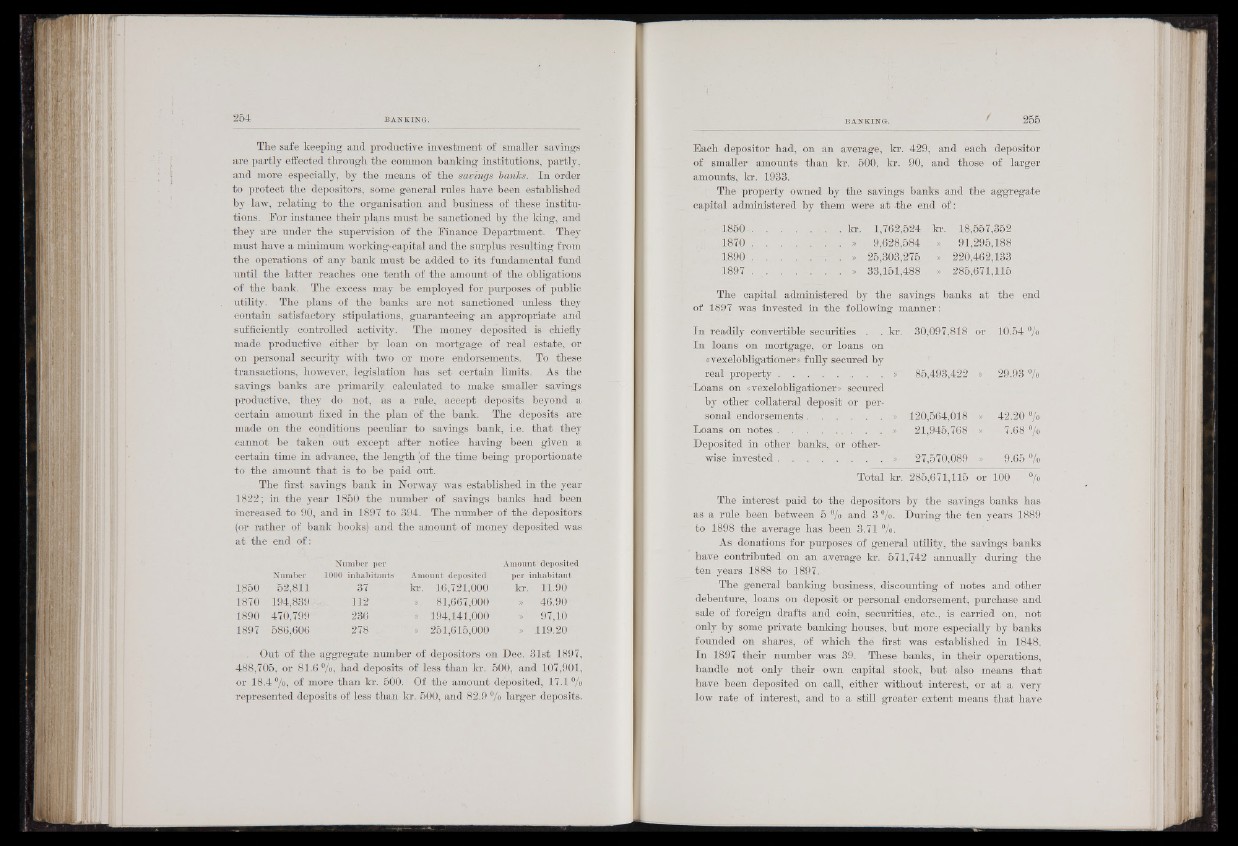
The safe keeping and productive investment of smaller savings
are partly effected through the common banking institutions, partly,
and more especially, by the means of the savings banks. In order
to protect the depositors, some general rules have been established
by law, relating to the organisation and business of these institutions.
For instance their plans must , be sanctioned by the king, and
they are under the supervision of the Finance Department. They
must have a minimum working-capital and the surplus resulting from
the operations of any bank must be added to its fundamental fund
until the latter reaches one tenth of the amount\of the obligations
of the bank. The excess may be employed for purposes of public
utility. The plans of the banks are not sanctioned unless they
contain satisfactory stipulations, guaranteeing an appropriate and
sufficiently controlled activity. The money deposited is chiefly
made productive either by loan on mortgage of real estate, or
on personal security with two or more endorsements. To these
transactions, however, legislation has set certain limits. As the
savings banks are primarily calculated to make smaller savings
productive, they do not, as a rule, accept deposits, beyond a
certain amount fixed in the plan of the bank. The deposits are
made on the conditions peculiar to savings bank, i.e. that they
cannot be taken out except after notice having been given a
certain time in advance, the length [of the time being proportionate
to the amount that is to be paid out.
The first savings bank in Norway was established in the year
1822; in the year 1850 the number of savings banks had been
increased to 90, and in 1897 to 394. The number of the depositors
(or rather of bank books) and the amount df money deposited was
a t the end of:
Number per Amount' deposited
Number 1000 inhabitants Amount deposited per inhabitant
1,850 52,811 37 kr. 16,721,000 kr. 11.90
1870 194,839 ; 112 ». 81,667,000 ' » 46.90
1890 470,799 236 194,141,000 97,10
1897 586,606 278 v » 251,615,000 119.20
Out of the aggregate number of depositors on Dec. 31st 1897,
488,705, or 81.6 %, had deposits of less than kr. 500, and 107,901,
or 18.4 °/o, of more than kr. 500. Of the amount deposited, 17.1 Vo
represented deposits of less than kr. 500, and 82.9 % larger deposits.
Each depositor had, on an average, kr. 429, and each depositor
of smaller amounts than kr. 500, kr. 90, and those of larger
amounts, kr. 1933.
The property owned by the savings banks and the aggregate
capital administered by them were at -the end of :
1850
1870
1890
1897
kr. 1,762,524
9,628,584
25,303,275.
33,151,488
kr. 18,557,352
91,295,188
220,462,133
285,671,115
The capital administered by the savings banks at the end
of 1897 was invested in the following manner:
In readily convertible securities . . kr.
In loans on mortgage, or loans on
«vexelobligationer» fully secured by
real property....................................~~P~-
Loans on «vexelobligationer» secured
by other collateral deposit or personal
endorsements. . . . . , »
Loans on notes .' .' . . . . . . . >
Deposited in other banks, or otherwise
invested . ......................... »
30,097,818 or 10.54 Vo-
85,493,422
120,564,018
21,945,768
27,570,089
29.93 %
42.20 °/o
7.68 °/o
9.65 %
Total kr. 285,671,115 or 100 %
The interest paid to the depositors by the savings banks has
as a rule been between 5 °/o and 3%. During the ten years 1889
to 1898 the average has been 3.71 %>■
As donations for purposes of general utility, the savings banks
have contributed on an average kr. 571,742 annually during the
ten years 1888 to 1897.
The general banking business; discounting of notes and other
debenture, loans on deposit or personal endorsement, purchase and
sale of foreign drafts and coin, securities, etc., is carried on, not
only by some private banking houses, but more especially by banks
founded on shares, of which the' first was established in 1848.
In 1897 their number was 39. These banks, in their operations,
handle not only their own capital stock, but also means that
have been deposited on call, either without interest, or at a very
low rate of interest, and to a still greater extent means that have